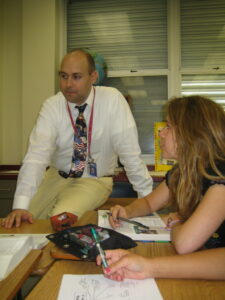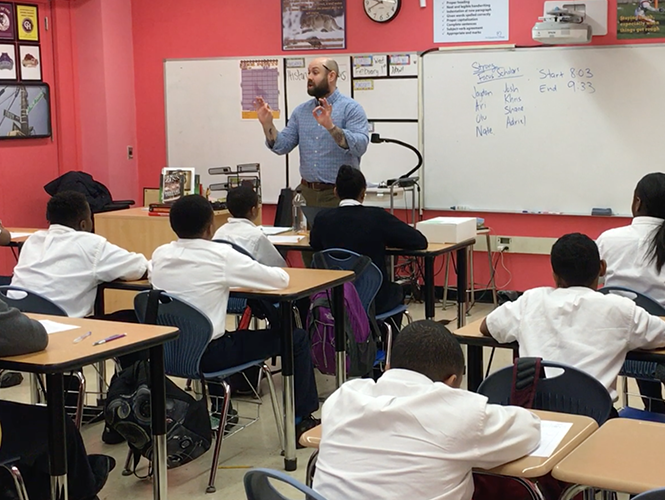In our new blog series, we are interviewing a member of the CT3 team about their background in education as well as the expertise that they each bring to their work with educators across the country.
Why did you want to become a teacher/educator?
In high school, I LOVED my history classes and began thinking about a career in teaching. I went off to college and took every history course that was offered, determined to be an expert historian. However, after graduating and actually getting into the classroom, I discovered how much more I loved working with the students! It is both a great challenge and privilege to be in a position where you directly influence the education and lives of children. The students, all of them, continue to be the reason that I proudly work in the education field.
Tell us about your background in education.
My undergraduate degree is in history and education. My first teaching position was in Japan, where I taught English to middle school students in the Japanese public school system. After a few years, I moved back to Florida where I was born, and began teaching AP History and Economics at one of the best high schools in Miami. A colleague of mine mentioned her experience as a member of Teach for America and suggested I look into it after I told her I was relocating to New York, where I later earned my graduate degree. I joined TFA and became a 3rd grade special education teacher in a Brooklyn charter school. I spent the next 9 years working with charter schools as an advocate, teacher, Real Time Teacher Coach and successful school leader. Before joining CT3, I served as a Director with a large charter school network overseeing the professional development for more than 55 school leaders across 35 schools in New York, Connecticut, and Rhode Island.
What was your first teaching experience like? What did it teach you?
It was frustrating, to be candid. The very real language barrier I encountered as an English-speaking teacher in a rural Japanese middle school often seemed insurmountable. It didn’t take long to realize that all the content expertise in the world can’t overcome a relationship lacking effective communication and mutual understanding. That same truth followed me to Miami, where I took for granted that having a shared language and culture with my students would result in every one of them succeeding in my classes. Building relationships with students, that were in service of learning, was a major revelation for me. I had to work HARD on addressing my negative controlling tendencies and removing the disempowering mindsets that held me back from being a great teacher for EVERY student. Above all, those early years taught me that my job was to ensure that 100% of the students in my class learned. Anything short of that was unacceptable.
Do you have any regrets from your first few years of teaching that you wish you could do over?
Absolutely. Having a growth mindset is a must for anyone who truly aspires to be the best for kids. In my first few years of teaching, I didn’t spend enough time and energy reflecting on my practices. As a result, I failed to reach some of my students and created a classroom where it was permissible to not meet expectations. Now, I am grateful to be in a position where I can help reach teachers and leaders that may share some of those same destructive relationship paradigms or mindsets.
What is your unique perspective when working with educators?
My perspective is the result of many years in education serving in numerous roles. I taught abroad and domestically, in classrooms where English was the first, second, or third language for my students. I taught elementary, middle, and high school. My class sizes were as low as five students and sometimes as high as 45. I was a teacher and leader in both traditional schools and charter schools. As for the RTTC (Real Time Teacher Coaching) process, I know exactly what that looks and feels like as a school leader, having been trained as a RTTC by CT3 Education many years ago. I understand the impact this work has on an entire school, its staff, and students. If you believe that it “takes one to know one,” then I can be a pretty useful resource.
What are you an ‘expert’ in besides CT3’s work?
My expertise lies in how coaches and leaders can influence school teams to perform at their highest levels through the creation and nurturing of a highly functional “adult culture”. Additionally, I have expertise in school turnarounds.
What in your opinion is the most important aspect of school in order to best serve students?
Everything is accomplished through relationships! It can be so easy to focus on the technical aspects of running a strong class, department, or school. The “what” is important; clarity does matter. Equally, the “how” is important; process does matter. In my experience, the “what” and the “how” can move mountains. However, the “why”, meaning the relationships between the people doing the work that connects to a deeper purpose and a relevancy to their lives, matters above all else.

What is your best advice for a first-year teacher?
Know that you are going to make mistakes. Teaching is the hardest role in a school, which is why it is also the most rewarding. Take the time and attention to understand who you are as a person and a professional. Take the time and attention to understand who your students are, all of them, as people and learners. If the decisions you make, and there will be A LOT of them to make, remain rooted in nurturing a healthy relationship that drives students to exceed high expectations, you are going to change lives.
If you could only tell educators ONE thing about No-Nonsense Nurturer, what would it be?
Incorporating No-Nonsense Nurturer trainings in your school, whether through Real Time Teacher Coaching or Real Time Leadership Coaching, is a life changer. Literally.
What’s been your proudest moment working with students?
If you have attended any of the No-Nonsense Nurturer trainings that I facilitated, you already know this story. When I first moved to Brooklyn to teach 3rd grade, there was a student in my class who was several grades behind in her math proficiency. If you study statistics, you know that students leaving the 3rd grade severely behind in reading or math often do not finish high school and encounter countless challenges in their lives. The outcome is even more dire for students of color. It was a long, hard year for both of us as we worked to get her math abilities to a place where she could enter the 4th grade with a fighting chance. We started every day early and finished late. There were many times she felt like quitting and many times when I wasn’t sure if I was going to be enough for her. We both knew what was at stake and why we couldn’t give up. It was emotional. She left my class that summer and I went to work at another school. Four years later, that same student transferred to my new middle school in the middle of her 7th grade year. She excelled in the classroom, all of them. Every single second we spent working together in 3rd grade was worth it. Relationships change lives!
Connect with Joey:
To read more about No-Nonsense Nurturer and Real Time Teacher coaching, visit this page.
Aside from No-Nonsense Nurturer and Real Time Teacher Coaching, check out Real Time Leadership Coaching to find out more about Professional Development for Teachers and Leaders, classroom management strategies, and building relationships with students and their families, and properly addressing important issues in the classroom and school.
Category: Leadership, Teaching


